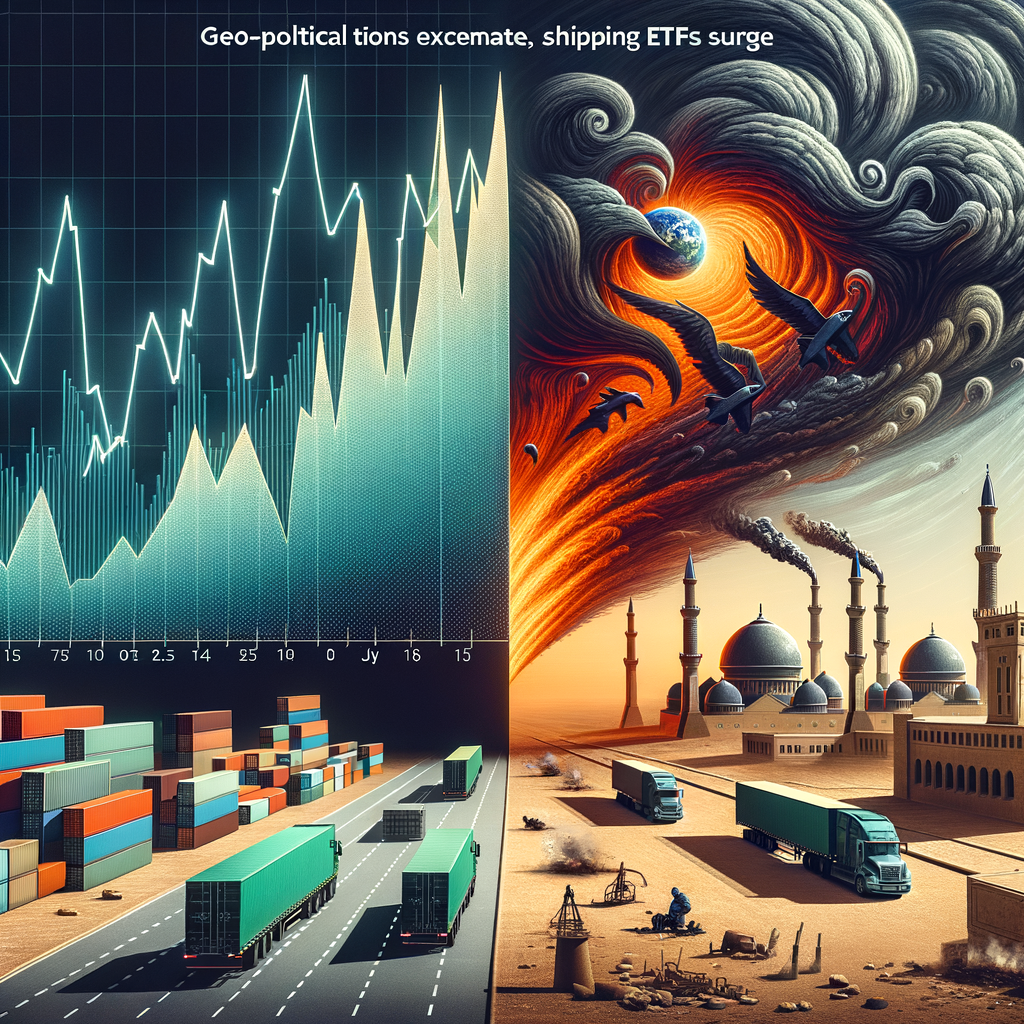Impact of U.S.-U.K. Military Actions in Yemen on Global Shipping ETF Performance
Shipping ETFs Surge as U.S. and U.K. Strike on Houthi Rebels in Yemen Raises Geopolitical Concerns
In a dramatic turn of events, shipping exchange-traded funds (ETFs) have experienced a significant surge following the joint military actions by the United States and the United Kingdom against Houthi rebels in Yemen. This uptick is a direct reflection of the heightened geopolitical concerns that have emerged as a result of the strikes, which have brought the strategic importance of the Red Sea and the Bab el-Mandeb Strait into sharp focus.
The Red Sea is one of the world’s most crucial maritime passages, serving as a gateway for shipping between Europe and Asia. It is also a vital route for oil and liquefied natural gas, making it a linchpin in the global energy supply chain. The recent military operations have underscored the vulnerability of this key shipping lane to regional instability, prompting investors to pay close attention to the shipping industry.
Interestingly, despite the potential for disruption, the market’s response has been overwhelmingly positive for shipping ETFs. Investors seem to be betting on the notion that any threat to the free flow of maritime traffic could lead to a spike in shipping rates, as shippers seek alternative routes or face delays. This, in turn, could boost the revenues of shipping companies, many of which are constituents of shipping ETFs.
Moreover, the swift response by the U.S. and U.K. militaries has been interpreted as a strong signal of their commitment to securing international shipping lanes. This assurance has provided a further fillip to investor confidence, as it suggests that major powers are willing to intervene to ensure that commerce remains uninterrupted. The result has been a buoyant shipping ETF market, with several funds posting gains that outpace broader market indices.
In addition to the immediate impact on shipping rates, there is also an optimistic view that the increased military presence in the region could lead to a longer-term stabilization of the area. This could mitigate the risk of piracy and other maritime threats that have historically plagued the Red Sea, thereby improving the safety and reliability of shipping operations.
Furthermore, the rise in shipping ETFs is not just a knee-jerk reaction to the recent military actions. It also reflects a broader trend in the shipping industry, which has been on the upswing thanks to a global economic recovery that has boosted demand for commodities and consumer goods. The industry has been navigating through the challenges posed by the COVID-19 pandemic, and the current geopolitical situation may serve as a catalyst for continued growth.
As the situation in Yemen evolves, the shipping industry will undoubtedly remain in the spotlight. However, the current optimism in the market suggests that investors are confident in the sector’s resilience and its ability to navigate through geopolitical headwinds. The surge in shipping ETFs is a testament to the strategic importance of maritime trade and the crucial role it plays in the global economy.
In conclusion, while the strikes on Houthi rebels in Yemen have raised geopolitical concerns, they have also highlighted the robustness of the global shipping industry. The surge in shipping ETFs is a clear indicator of investor optimism, reflecting a belief in the sector’s growth potential and its capacity to weather geopolitical storms. As the world continues to watch the developments in Yemen, the shipping industry stands as a beacon of resilience, buoyed by a market that recognizes its enduring significance.
Navigating Geopolitical Risks: Investment Strategies for Shipping ETFs Amidst Middle East Tensions
Shipping ETFs Surge as U.S. and U.K. Strike on Houthi Rebels in Yemen Raises Geopolitical Concerns
In a world where geopolitical tensions often dictate the ebb and flow of the markets, the recent surge in shipping exchange-traded funds (ETFs) has caught the eye of investors around the globe. The uptick comes on the heels of a joint military operation by the United States and the United Kingdom against Houthi rebels in Yemen, a move that has escalated concerns over the stability of one of the world’s most vital shipping lanes, the Bab el-Mandeb Strait. Despite the potential for disruption, the investment community remains optimistic, viewing the current climate as an opportunity to navigate through the complexities of geopolitical risks with strategic precision.
The Bab el-Mandeb Strait is a strategic chokepoint in the global shipping industry, serving as a gateway for oil and cargo vessels traveling between the Mediterranean Sea and the Indian Ocean via the Suez Canal. Any threat to the security of this passage can have far-reaching implications for global trade, often resulting in a ripple effect that boosts the value of shipping ETFs. As tensions in the Middle East rise, investors are keenly aware of the potential for supply chain disruptions, which can lead to increased shipping rates and, consequently, higher revenues for shipping companies.
Amidst the uncertainty, the resilience of shipping ETFs is a testament to the sector’s ability to weather geopolitical storms. Investors are taking note of the industry’s robust fundamentals, including a surge in demand for goods as economies rebound from the pandemic-induced slowdown. This demand, coupled with the current geopolitical situation, has created a perfect storm for shipping ETFs, propelling them to new heights.
Moreover, the strategic response from investors has been to diversify their portfolios, incorporating shipping ETFs as a hedge against volatility in other sectors. The logic is clear: while other industries may falter in the face of geopolitical unrest, shipping remains a critical component of global commerce, one that is often able to command higher prices during times of uncertainty. This dynamic has led to a surge in investor interest, with many seeing shipping ETFs as a safe harbor in a sea of market turbulence.
Furthermore, the optimism in the market is not unfounded. History has shown that the shipping industry has an uncanny ability to adapt and thrive even under adverse conditions. Companies within the sector are known for their agility in rerouting vessels and adjusting operations to mitigate risks. This adaptability is reflected in the performance of shipping ETFs, which have demonstrated resilience in the face of past geopolitical conflicts.
As investors continue to navigate the choppy waters of the Middle East tensions, the focus remains on the long-term potential of shipping ETFs. The current geopolitical concerns, while significant, are but one factor in the complex calculus of global trade. With careful analysis and a measured approach, investors are finding ways to capitalize on the situation, reinforcing the notion that even in times of geopolitical strife, there are opportunities to be found.
In conclusion, the surge in shipping ETFs amidst the recent U.S. and U.K. military actions in Yemen is a reminder of the intricate interplay between geopolitics and the markets. While the situation underscores the risks inherent in global trade, it also highlights the potential for strategic investment moves that can yield positive returns. As the world watches the developments in the Middle East, the shipping industry and its investors sail on, buoyed by an optimistic outlook and a steadfast belief in the sector’s enduring importance to the global economy.







